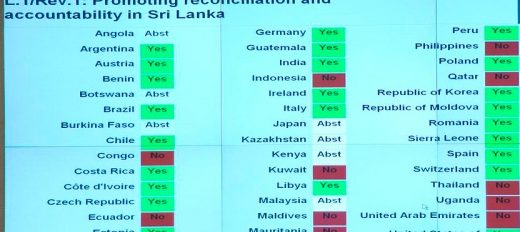Sri Lanka faces tough international challenge as Geneva sessions begin, Govt. to propose two-year road map.
The biggest international challenge for Sri Lanka will unfold in the coming week as the UN Human Rights Council receives the findings of the probe into alleged war crimes by troops and Tiger guerrillas.
A copy of the report, which has already been provided to the Government of Sri Lanka, is being kept a close secret until it is formally placed on the UNHRC’s official website anytime next week. However, diplomatic sources say the probe team has made strong indictments against both the troops and the guerrillas over purported war crimes.
Though no politicians or those who were in combat have been named, these sources said, identification of those involved was not difficult since reference was being made in the findings to the chain of command with the identification of areas where violations occurred.
According to some sources, the previous Government has also been strongly indicted for what they call systematically denying or depriving food and medicine to civilians in war-affected areas. It has taken note of reports by the Government Agent for Wanni that some 350,000 civilians were affected by this move, the sources added.
Even before some of the allegations became the specific subject of a probe titled “OISL” under the Office of the High Commissioner for Human Rights, the sponsor of the resolution as well as countries that backed it called for an international investigation. However, the new Government that took office in January succeeded in persuading them to agree to a “credible domestic inquiry” after the OISL findings are made known.
The United States’ position was articulated in Colombo by Nisha Biswa, Assistant Secretary in the Department of State. Addressing an “invitees only” news conference at the American Center — the Sunday Times was not an invitee — Ms. Biswal said, “We fundamentally believe that you’re going to have a more durable outcome if there is a very strong and credible domestic process that actually brings communities together in the country. As Secretary Kerry reiterated during his visit, we fundamentally support efforts to create a credible domestic process for accountability and for reconciliation.”
Tom Malinowski Assistant Secretary of State for Democracy, Human Rights and Labour, who accompanied Ms. Biswal declared, “We have said that we support a domestic mechanism that will be credible to all of the affected communities in Sri Lanka. I would also add that international support for this process has been, and will continue to be important to building trust and confidence….”
Notwithstanding the public statements for Sri Lankans during the Colombo news conference, Mr. Malinowski has been more pointed in the tweets he made on the issue. A sampling: “US will back the Sri Lanka Accountability process if it’s credible, done in consultation with the victims and in co-operation with the United Nations.” – “When UN report comes hope Sri Lanka Government will continue defending the country without being defensive, accepting the need to fully, honestly confront past.”
That the US position has not helped one of the stakeholders in the issue – the Tamil National Alliance (TNA) – became clear yesterday. Its leader Rajavarothayam Sampanthan was busy with the draft of a letter he is sending to the UN Human Rights High Commissioner Zeid Ra’ad Al Hussein, seeking a meeting with him in Geneva.
The TNA wants to impress on him the need for an international investigation. The TNA also has another unenviable issue – different groups, some hardliners who support Chief Minister C.V. Wigneswaran, want to be in Geneva to push their different campaigns.
However, other Tamil sources in Colombo, not aligned to the TNA, held a different view. They claimed that a “credible domestic inquiry” mechanism, which would “satisfy all stakeholders”, would have expert foreign technical assistance, the oversight of the UNHRC and be based on a two-year road map Foreign Minister Mangala Samaraweera would present. Such a road map, these sources said, would mean that Sri Lanka would have to keep the UNHRC briefed at its every session on the progress in the “domestic inquiry”. “All that would make it function much the same as an international inquiry,” a source pointed out.
In June 2014, the High Commissioner for Human Rights appointed three experts — Martti Ahtisaari, a former President of Finland, Silvia Cartwright, a former High Court judge of New Zealand, and Asma Jahangir, former President of the Human Rights Commission of Pakistan, to play a supportive and advisory role, as well as independent verification throughout the investigation.
ST
